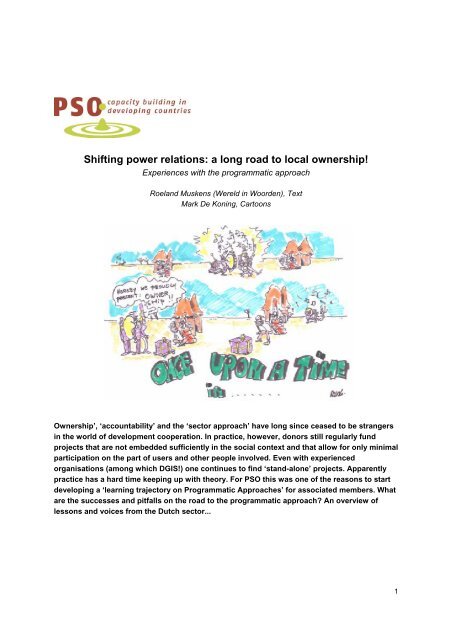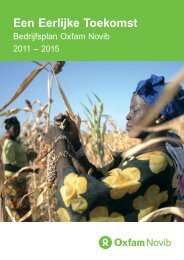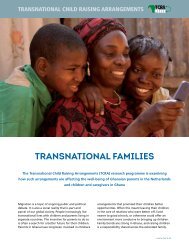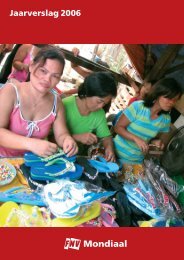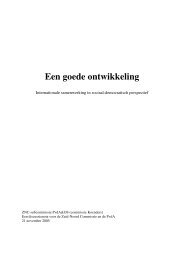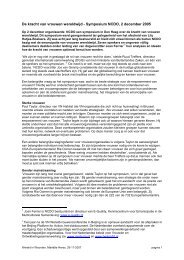Shifting power relations: a long road to local ownership! - Wereld in ...
Shifting power relations: a long road to local ownership! - Wereld in ...
Shifting power relations: a long road to local ownership! - Wereld in ...
You also want an ePaper? Increase the reach of your titles
YUMPU automatically turns print PDFs into web optimized ePapers that Google loves.
<strong>Shift<strong>in</strong>g</strong> <strong>power</strong> <strong>relations</strong>: a <strong>long</strong> <strong>road</strong> <strong>to</strong> <strong>local</strong> <strong>ownership</strong>!<br />
Experiences with the programmatic approach<br />
Roeland Muskens (<strong>Wereld</strong> <strong>in</strong> Woorden), Text<br />
Mark De Kon<strong>in</strong>g, Car<strong>to</strong>ons<br />
Ownership’, ‘accountability’ and the ‘sec<strong>to</strong>r approach’ have <strong>long</strong> s<strong>in</strong>ce ceased <strong>to</strong> be strangers<br />
<strong>in</strong> the world of development cooperation. In practice, however, donors still regularly fund<br />
projects that are not embedded sufficiently <strong>in</strong> the social context and that allow for only m<strong>in</strong>imal<br />
participation on the part of users and other people <strong>in</strong>volved. Even with experienced<br />
organisations (among which DGIS!) one cont<strong>in</strong>ues <strong>to</strong> f<strong>in</strong>d ‘stand-alone’ projects. Apparently<br />
practice has a hard time keep<strong>in</strong>g up with theory. For PSO this was one of the reasons <strong>to</strong> start<br />
develop<strong>in</strong>g a ‘learn<strong>in</strong>g trajec<strong>to</strong>ry on Programmatic Approaches’ for associated members. What<br />
are the successes and pitfalls on the <strong>road</strong> <strong>to</strong> the programmatic approach An overview of<br />
lessons and voices from the Dutch sec<strong>to</strong>r...<br />
1
In PSO’s perspective, a programmatic approach is all about: <strong>ownership</strong> of <strong>local</strong> organisations; a<br />
‘b<strong>road</strong> approach’ that starts with an <strong>in</strong>-depth analysis of the social context; <strong>in</strong>volvement of several<br />
stakeholders; and donor coord<strong>in</strong>ation. In itself noth<strong>in</strong>g new under the sun, but at the same time easier<br />
said than done.<br />
The programmatic approach that PSO members are work<strong>in</strong>g on, fits with the Sec<strong>to</strong>r Wide Approach<br />
(SWAp) that was embraced by Foreign Affairs a couple of years ago. Accord<strong>in</strong>g <strong>to</strong> the 2006 IOB<br />
report ‘From Project Aid <strong>to</strong>wards Sec<strong>to</strong>r Support’, DGIS is also struggl<strong>in</strong>g with the transition <strong>to</strong> a<br />
b<strong>road</strong>er approach. “In over half of the 22 priority countries, however, the <strong>in</strong>tention <strong>to</strong> give less<br />
earmarked support was not achieved and project aid is still dom<strong>in</strong>ant,” IOB concludes. The struggle<br />
with work<strong>in</strong>g programmatically is thus not exclusively the doma<strong>in</strong> of NGO donors and their partners.<br />
Accord<strong>in</strong>g <strong>to</strong> Roel Snelder from the PSO Knowledge and Learn<strong>in</strong>g Centre, the recent <strong>in</strong>terest <strong>in</strong> the<br />
programmatic approach among its members is significantly related <strong>to</strong> the discussion about resul<strong>to</strong>riented<br />
work. The call for results, Snelder th<strong>in</strong>ks, has reached the development sec<strong>to</strong>r rather late.<br />
“For a <strong>long</strong> time, our sec<strong>to</strong>r revolved around show<strong>in</strong>g solidarity; ‘do<strong>in</strong>g good’. With the current trend on<br />
accountability, we are catch<strong>in</strong>g up quickly. The assertion of many of our members is that work<strong>in</strong>g<br />
programmatically leads <strong>to</strong> more susta<strong>in</strong>able results, <strong>to</strong> more impact.<br />
With the emphasis on impact, the issue of ‘client satisfaction’ is accord<strong>in</strong>g <strong>to</strong> Snelder, also com<strong>in</strong>g<br />
centre stage. “The perspective of the end users is now, at least <strong>in</strong> theory, show<strong>in</strong>g a comeback.<br />
Snelder: “In the past – let’s say from Paulo Freire onwards – contributions from and participation by<br />
the end users was what development was supposed <strong>to</strong> be all about. Many donor organisations now –<br />
rightly so - work through <strong>in</strong>termediate partner organisations, but there is often little time <strong>to</strong> dialogue<br />
with them on beneficiaries’ perspectives, let alone <strong>in</strong>teract with end users directly. We assume that our<br />
assistance au<strong>to</strong>matically benefits the poor, but – see<strong>in</strong>g the way we are organised - the less selfevident<br />
this becomes. So paradoxically the professionalisation of our organisations seems <strong>to</strong> have<br />
removed us further from the field. We need <strong>to</strong> make sure that our work<strong>in</strong>g methods are adjusted <strong>to</strong><br />
beneficiaries. Work<strong>in</strong>g programmatically means we need <strong>to</strong> start ask<strong>in</strong>g ourselves questions on<br />
participation and <strong>ownership</strong> all over aga<strong>in</strong>”.<br />
Learn<strong>in</strong>g on programmatic approaches<br />
In response <strong>to</strong> requests from member organisations, PSO <strong>in</strong> 2003 started a ‘learn<strong>in</strong>g trajec<strong>to</strong>ry’ <strong>to</strong><br />
map the bottlenecks and conditions of a programmatic approach and <strong>to</strong> <strong>in</strong>vestigate, <strong>to</strong>gether with the<br />
member organisations and their partners <strong>in</strong> the South, what this new approach implies for methods of<br />
work and mutual <strong>relations</strong>hips. PSO’s Knowledge Centre has summarised the experiences collected<br />
from workshops and ‘pilot programmes’ over the last few years <strong>in</strong> eight lessons (see box).<br />
2
Eight vital lessons on the programmatic approach<br />
1. The perspective of end users ought <strong>to</strong> get priority<br />
2. More attention <strong>to</strong> the preparation and participation of all relevant stakeholders<br />
3. Partner<strong>in</strong>g and dialogue <strong>in</strong> a ‘system-perspective’<br />
4. <strong>Shift<strong>in</strong>g</strong> of responsibilities with <strong>ownership</strong> <strong>to</strong> the ‘South’<br />
5. Attention <strong>to</strong> the role of ‘change agents’ and the support of the management<br />
6. More donor-harmonisation and work<strong>in</strong>g <strong>to</strong>wards trust <strong>in</strong>stead of control<br />
7. Mix<strong>in</strong>g of ‘hard skills’ and ‘soft skills’<br />
8. There are no standard solutions<br />
These lessons guide a <strong>to</strong>olbox developed by PSO. Organisations (both <strong>in</strong> the North and <strong>in</strong> the South) that want<br />
<strong>to</strong> take a step <strong>in</strong><strong>to</strong> the direction of more programmatic work, will f<strong>in</strong>d <strong>in</strong> the <strong>to</strong>olbox the experiences and<br />
reflections of organisations that passed through the PSO learn<strong>in</strong>g trajec<strong>to</strong>ry. Moreover each ‘lesson’ conta<strong>in</strong>s a<br />
questionnaire, which helps organisations <strong>to</strong> ga<strong>in</strong> <strong>in</strong>sight <strong>in</strong><strong>to</strong> their own ‘programmatic practice’. The <strong>to</strong>olbox is<br />
available at the PSO-website (http://www.pso.nl/asp/documentsite.aspdocument=828)<br />
Core f<strong>in</strong>d<strong>in</strong>g from the learn<strong>in</strong>g trajec<strong>to</strong>ry is that <strong>power</strong> <strong>relations</strong> between donors and recipient<br />
organisations are shift<strong>in</strong>g. This makes the transition more tricky. After all, theoretically nobody has any<br />
objections <strong>to</strong> ‘<strong>ownership</strong>’ <strong>in</strong> ‘the South’, but <strong>in</strong> practice hand<strong>in</strong>g over decision-mak<strong>in</strong>g <strong>power</strong>s often<br />
proves problematic. Development organisations cannot only look south. Most organisations have their<br />
roots <strong>in</strong> western societies: this is where their support is located and where their funds come from.<br />
Decisions about the spend<strong>in</strong>g of money, about plann<strong>in</strong>g, moni<strong>to</strong>r<strong>in</strong>g and evaluation needs <strong>to</strong> be <strong>in</strong> l<strong>in</strong>e<br />
with public support for development cooperation <strong>in</strong> the North. PSO will cont<strong>in</strong>ue <strong>to</strong> support its<br />
associated organisations <strong>in</strong> the transition <strong>to</strong> a programmatic approach. What are the questions of<br />
<strong>to</strong>day that arise with<strong>in</strong> PSO member organisations Let’s hear some members’ voices …….<br />
More coherent <strong>in</strong>terventions<br />
Herman Brouwer of ICCO sketches the progress made as a result of the change-over from project<br />
work <strong>to</strong> programmatic approach: “In the past we used <strong>to</strong> send tropical doc<strong>to</strong>rs <strong>to</strong> Malawi, build a small<br />
cl<strong>in</strong>ic and educate the medical staff. While that was all quite useful, it has come <strong>to</strong> appear <strong>in</strong>creas<strong>in</strong>gly<br />
futile given the ‘tsunami’ of HIV-Aids cases and the massive emigration of medical personnel.<br />
To tackle this problem we brought all stakeholders <strong>to</strong>gether and discussed the best ways <strong>to</strong> <strong>in</strong>tervene.<br />
The shared analysis showed that our approach of support<strong>in</strong>g hospitals was <strong>to</strong>o limited. We jo<strong>in</strong>tly<br />
decided <strong>in</strong> favour of a series of related <strong>in</strong>terventions – one could call this a programme – which would<br />
<strong>in</strong>clude support <strong>to</strong> <strong>in</strong>dividual hospitals as well as post<strong>in</strong>g ab<strong>road</strong> of personnel (tropical doc<strong>to</strong>rs), while<br />
at the same time we committed ourselves <strong>to</strong> mak<strong>in</strong>g it more attractive for <strong>local</strong> medical staff <strong>to</strong> rema<strong>in</strong><br />
<strong>in</strong> Malawi. For <strong>in</strong>stance by offer<strong>in</strong>g decent hous<strong>in</strong>g and sufficient career perspective.” “The hous<strong>in</strong>g<br />
project moreover gave us the opportunity <strong>to</strong> <strong>in</strong>volve private partners, <strong>in</strong>dividuals and companies active<br />
<strong>in</strong> development cooperation. The build<strong>in</strong>g of houses for nurses and doc<strong>to</strong>rs <strong>in</strong> the vic<strong>in</strong>ity of hospitals<br />
can very well be f<strong>in</strong>anced through private gifts and <strong>in</strong>itiatives from Dutch <strong>in</strong>dividuals and companies.<br />
We have also <strong>in</strong>corporated a trajec<strong>to</strong>ry <strong>to</strong> <strong>in</strong>crease <strong>in</strong>fluence on the national health care policy on the<br />
part of civil society. All <strong>in</strong> all, we believe, a more susta<strong>in</strong>able approach.”<br />
3
Luuk van Schothorst from the organisation Woord en Daad puts forward the cha<strong>in</strong> approach as an<br />
example of a ‘b<strong>road</strong> approach’. By expand<strong>in</strong>g its view beyond one project, Woord en Daad managed<br />
<strong>to</strong> spectacularly improve its support <strong>to</strong> cashew nut producers <strong>in</strong> Burk<strong>in</strong>a Faso. “We <strong>to</strong>ok a good look at<br />
the cha<strong>in</strong> and managed <strong>to</strong> locate a process<strong>in</strong>g company for cashew nuts. Chances are that the<br />
farmers whom we support will be able <strong>to</strong> supply <strong>to</strong> that company <strong>in</strong> the near future. And with<strong>in</strong> the<br />
same process we also located an importer <strong>in</strong> the Netherlands, so that holds good prospects. This is<br />
really a result of the programmatic approach; suddenly many l<strong>in</strong>es meet.” Van Schothorst stresses the<br />
need for an analysis shared by all stakeholders: “All those <strong>in</strong>volved must be able <strong>to</strong> see the benefits.<br />
You must not create th<strong>in</strong>gs artificially. And ventures should be made profitable. Bus<strong>in</strong>ess is bus<strong>in</strong>ess.”<br />
Accord<strong>in</strong>g <strong>to</strong> Herman Brouwer (ICCO) a one-dimensional project approach does not <strong>in</strong>vite a proper<br />
analysis of the context and the social circumstances with<strong>in</strong> which one operates. He gives the example<br />
of the support given <strong>to</strong> farmers <strong>in</strong> develop<strong>in</strong>g countries <strong>in</strong> ga<strong>in</strong><strong>in</strong>g access <strong>to</strong> the market <strong>in</strong> order <strong>to</strong> sell<br />
their products. “If your aim is <strong>to</strong> get farmers on<strong>to</strong> the market, a cha<strong>in</strong> approach is required. Work<strong>in</strong>g<br />
solely on project basis does not provide <strong>in</strong>sight <strong>in</strong><strong>to</strong> the full cha<strong>in</strong>. A programmatic approach br<strong>in</strong>gs<br />
many different ac<strong>to</strong>rs <strong>to</strong>gether. This allows them <strong>to</strong> l<strong>in</strong>k up and <strong>to</strong> tackle the problems <strong>in</strong> a far more<br />
susta<strong>in</strong>able way. Or, if necessary, a lobby trajec<strong>to</strong>ry can be connected <strong>to</strong> it.”<br />
All <strong>to</strong>gether around one table<br />
It is essential for the programmatic approach that all relevant stakeholders come <strong>to</strong>gether at the start<br />
of the cycle <strong>in</strong> order <strong>to</strong> jo<strong>in</strong> hands <strong>in</strong> analys<strong>in</strong>g the social context and try<strong>in</strong>g <strong>to</strong> list the most important<br />
challenges. Jo<strong>in</strong><strong>in</strong>g at one table and analys<strong>in</strong>g <strong>to</strong>gether is not that easy. After all, who do you <strong>in</strong>vite<br />
How do you ensure that all po<strong>in</strong>ts of view are put on the table How do you deal with conflicts of<br />
<strong>in</strong>terest And: how <strong>to</strong> make sure that those present do not simply look question<strong>in</strong>gly at the donor<br />
Responses vary. Christ<strong>in</strong>e Fenenga of Cordaid stresses that there have <strong>to</strong> be good reasons <strong>to</strong> <strong>in</strong>vite<br />
someone. “In develop<strong>in</strong>g countries <strong>to</strong>o people are busy, you cannot send for them just for any reason.<br />
Only people who are <strong>in</strong>volved with the theme feel like attend<strong>in</strong>g such a meet<strong>in</strong>g.” Another problem is<br />
the vast difference <strong>in</strong> competences, Fenenga adds. “If th<strong>in</strong>gs have <strong>to</strong> be expla<strong>in</strong>ed repeatedly, experts<br />
will be quick <strong>to</strong> pull out.” Cordaid gives the <strong>local</strong> partner the ma<strong>in</strong> responsibility of choos<strong>in</strong>g the <strong>local</strong><br />
stakeholders: “They know the most important players as well as the mutual <strong>relations</strong>hips.” Conflicts of<br />
<strong>in</strong>terest are not the most difficult problem, Herman Brouwer (ICCO) th<strong>in</strong>ks. “As <strong>long</strong> as the analysis is<br />
shared, conflict<strong>in</strong>g <strong>in</strong>terests are no big issue. But you have <strong>to</strong> name them, of course.”<br />
Many organisations make use of a professional ‘facilita<strong>to</strong>r’ for such crucial stakeholder meet<strong>in</strong>gs.<br />
Rens Verstappen (Leprasticht<strong>in</strong>g): “A competent facilita<strong>to</strong>r makes sure that everyone can have a say<br />
<strong>in</strong> the matter. To start with, we work with a permanent panel chairman from the Netherlands. This<br />
person knows when it is sensible <strong>to</strong> split up <strong>in</strong><strong>to</strong> sub-groups, and when <strong>to</strong> stick <strong>to</strong> plenary discussion.<br />
That is also culturally determ<strong>in</strong>ed. In Indonesia for <strong>in</strong>stance, people usually express themselves much<br />
less directly and hierarchy plays an important role. This knowledge serves as a key determ<strong>in</strong>ant <strong>in</strong> the<br />
formation of sub-groups. In Nigeria, people very easily and confidently express themselves <strong>in</strong> public,<br />
also <strong>in</strong> plenary sessions.” The Leprasticht<strong>in</strong>g has by now tra<strong>in</strong>ed <strong>local</strong> people <strong>to</strong> chair such meet<strong>in</strong>gs.<br />
“We now have two female facilita<strong>to</strong>rs <strong>in</strong> Nigeria who are perfectly able <strong>to</strong> lead a stakeholder meet<strong>in</strong>g.”<br />
4
The Netherlands <strong>in</strong>stitute for Southern Africa (NiZA) organised a consultation meet<strong>in</strong>g <strong>to</strong> give shape <strong>to</strong><br />
its ‘Human Rights and Peace Build<strong>in</strong>g Programme’. Maaike Blom: “Such a consultation meet<strong>in</strong>g is<br />
extremely <strong>in</strong>tensive. In our case it <strong>to</strong>ok four full days. We hired a professional facilita<strong>to</strong>r which proved<br />
very useful, especially <strong>in</strong> creat<strong>in</strong>g a pleasant and confidence-build<strong>in</strong>g atmosphere. Initially the<br />
participants’ attitude was <strong>to</strong> wait and see; they did not know what NiZA had <strong>in</strong> m<strong>in</strong>d. Some<br />
organisations were also new <strong>to</strong> us. We were very clear from the start about what <strong>to</strong> expect from us,<br />
which proved very valuable. After that we <strong>in</strong>vited the partners <strong>to</strong> give their presentations. What jo<strong>in</strong>t<br />
analysis and plann<strong>in</strong>g boils down <strong>to</strong> is giv<strong>in</strong>g your partners the opportunity <strong>to</strong> say ‘no’. There is no<br />
po<strong>in</strong>t <strong>in</strong> frenetically try<strong>in</strong>g <strong>to</strong> keep everyone on board.”<br />
Another rule of thumb, Blom says, is for donors <strong>to</strong> be prepared <strong>to</strong> adjust their presuppositions. “We for<br />
<strong>in</strong>stance did this concern<strong>in</strong>g the gender approach. We had decided <strong>in</strong> advance that there should not<br />
be a separate women’s cluster. We thought it important <strong>to</strong> <strong>in</strong>tegrate this theme <strong>in</strong><strong>to</strong> all the other<br />
themes. But the response from the women’s organisations, made us change our m<strong>in</strong>d: ‘first give us<br />
time <strong>to</strong> grow and become strong’, they said, ‘after that we can beg<strong>in</strong> <strong>to</strong> ma<strong>in</strong>stream’.”<br />
Contributions from ord<strong>in</strong>ary people<br />
Involv<strong>in</strong>g end users <strong>in</strong> sett<strong>in</strong>g up programmes is anyth<strong>in</strong>g but easy, so we are <strong>to</strong>ld by many. Blom<br />
confirms that her organisation does not have direct contact with its beneficiaries. At the consultation<br />
meet<strong>in</strong>g <strong>in</strong> preparation of the human rights programme that NiZA supports <strong>in</strong> Southern Africa, no<br />
‘ord<strong>in</strong>ary’ people participated. The perspective of the end users was put forward by ‘bare-foot-lawyers’<br />
who do know the <strong>in</strong>terests of ord<strong>in</strong>ary people <strong>in</strong> sett<strong>in</strong>g up a human rights programme.<br />
Rens Verstappen (Leprasticht<strong>in</strong>g) says his organisation <strong>to</strong>o has <strong>to</strong> make an effort <strong>to</strong> <strong>in</strong>volve the<br />
ord<strong>in</strong>ary patient. “We <strong>in</strong>vite articulate patients <strong>to</strong> plann<strong>in</strong>g meet<strong>in</strong>gs, but often without result. When<br />
they do contribute, we do get useful <strong>in</strong>formation, for <strong>in</strong>stance that people postpone go<strong>in</strong>g <strong>to</strong> the<br />
hospital as <strong>long</strong> as possible when they suspect <strong>to</strong> be suffer<strong>in</strong>g from leprosy. This is because leprosy<br />
patients are stigmatised. In some cases this has resulted <strong>in</strong> adjustments <strong>in</strong> the orig<strong>in</strong>al plann<strong>in</strong>g.”<br />
5
Luuk van Schothorst (Woord en Daad) has a “baffl<strong>in</strong>g s<strong>to</strong>ry” <strong>to</strong> tell about what can happen if you do<br />
<strong>in</strong>vite end users for a “participative <strong>in</strong>ven<strong>to</strong>ry of <strong>local</strong> needs”. At one such meet<strong>in</strong>g, organised by a<br />
partner <strong>in</strong> Burk<strong>in</strong>a Faso <strong>in</strong> mid 2006, the participants’ expectations about the presence of a foreign<br />
donor turned out <strong>to</strong> be runn<strong>in</strong>g high. “Instead of jo<strong>in</strong>tly analys<strong>in</strong>g the problems <strong>in</strong> the region, we were<br />
blandly presented with a shopp<strong>in</strong>g list: so many irrigation channels, so many kilometres of asphalted<br />
<strong>road</strong>, so many dams, and etcetera. And would we k<strong>in</strong>dly take care of that. “The Santa Claus model”,<br />
accord<strong>in</strong>g <strong>to</strong> Van Schothorst. The solution must probably be sought <strong>in</strong> ‘expectation management’. The<br />
people round the table should have an <strong>in</strong>sight <strong>in</strong><strong>to</strong> each other’s possibilities and limitations.<br />
Partner<strong>in</strong>g with <strong>local</strong> government<br />
Many organisations struggle with their attitude <strong>to</strong>wards the government, who are relevant stakeholders<br />
<strong>in</strong> nearly all cases. This may even be true <strong>in</strong> countries with a highly politicised separation between<br />
government and NGOs. As part of the action learn<strong>in</strong>g process with<strong>in</strong> PSO’s learn<strong>in</strong>g trajec<strong>to</strong>ry, Filip<strong>in</strong>o<br />
organisation CPTCSA, a partner of PSO member Terre des Hommes, experimented <strong>to</strong> cooperate<br />
more with government. Despite the ‘difficult’ <strong>relations</strong>hip between civil organisations and the<br />
government of the Philipp<strong>in</strong>es, the decision <strong>to</strong> <strong>in</strong>vite the government as stakeholder eventually led <strong>to</strong><br />
the ‘up-scal<strong>in</strong>g’ of the anti child abuse curriculum <strong>in</strong> schools.<br />
Especially ‘politically oriented’ organisations see themselves as ‘opposition force’ and consider the<br />
government an antagonist rather than a potential partner. NiZA usually chooses <strong>to</strong> keep the<br />
government out. Maaike Blom: “In conversations on human rights the government is a sensitive<br />
subject, because they are often ac<strong>to</strong>rs <strong>in</strong> human rights violations. Many of our partners are be<strong>in</strong>g<br />
oppressed, which makes it hard <strong>to</strong> work <strong>to</strong>gether with the governments. This is especially true <strong>in</strong> a<br />
country like Zimbabwe, with an extremely repressive government. But elsewhere <strong>to</strong>o it is difficult.<br />
Partners <strong>in</strong>dicate how far they want <strong>to</strong> go, tak<strong>in</strong>g <strong>in</strong><strong>to</strong> account their own safety. It is not up <strong>to</strong> NiZA <strong>to</strong><br />
break through this, and it would be presumptuous <strong>to</strong> suddenly start conversations with the<br />
government.” Accord<strong>in</strong>g <strong>to</strong> Blom, when enter<strong>in</strong>g <strong>in</strong><strong>to</strong> (new) forms of cooperation you always need <strong>to</strong><br />
make a choice between ‘width’ and ‘depth’. “The right path must be somewhere <strong>in</strong> the middle”.<br />
The Leprasticht<strong>in</strong>g positions itself at the other end of the spectrum. The government is actually its only<br />
partner. Verstappen: “Leprosy is a dangerous, contagious disease. The fight aga<strong>in</strong>st it is, by def<strong>in</strong>ition,<br />
a task for the government.” But that does not mean that we only <strong>in</strong>vite the government <strong>to</strong> the table.<br />
“Also other stakeholders participate, like the WHO, tuberculosis organisations, universities and<br />
hospitals. Together with our partners we make the decisions about who is <strong>to</strong> be <strong>in</strong>vited.”<br />
The government was a relevant participant at the above-mentioned stakeholder consultation<br />
organised by Woord en Daad <strong>in</strong> Burk<strong>in</strong>a Faso. Luuk van Schothorst: “We like <strong>to</strong> <strong>in</strong>volve the<br />
government <strong>in</strong> the new programm<strong>in</strong>g. That goes for district governments, but also for village elders. It<br />
is important not only <strong>to</strong> know one’s way <strong>to</strong> the government offices, but also <strong>to</strong> know the key persons<br />
work<strong>in</strong>g there as well as their fields of <strong>in</strong>terest. Even the actual people <strong>in</strong>volved are known by us. Even<br />
though the government is not <strong>in</strong>volved <strong>in</strong> the discussion about programmes, we always present our<br />
plans <strong>to</strong> the relevant civil servants.”<br />
6
Ownership is the vulnerable spot<br />
Ownership is central <strong>in</strong> the programmatic approach, and perhaps the very flaw <strong>in</strong> every form of<br />
development cooperation. The idea is that, as <strong>long</strong> as you set up a programme jo<strong>in</strong>tly, <strong>in</strong> dialogue with<br />
all those <strong>in</strong>volved, and as <strong>long</strong> as you grant <strong>local</strong> forces maximum voice and authority, they will<br />
consider themselves the ‘owners’, and consequently they will guarantee its susta<strong>in</strong>ability. Luuk van<br />
Schothorst (Woord en Daad): “If you lose <strong>ownership</strong>, the battle is lost. It is deadly when a partner<br />
plays up <strong>to</strong> you. The partner’s contribution is essential. It helps <strong>to</strong> be a loyal donor, so that your<br />
partner need not worry that you will pull out as soon as he says someth<strong>in</strong>g that does not please you.”<br />
With<strong>in</strong> a programmatic approach, <strong>ownership</strong> does not mean though that donors sidel<strong>in</strong>e themselves.<br />
Nearly all the people quoted <strong>in</strong> this article endorse the notion that the donor’s role as regards <strong>to</strong><br />
content is <strong>in</strong> fact on the <strong>in</strong>crease. With<strong>in</strong> a programmatic approach, donors are full participants <strong>in</strong> the<br />
conversations about a programme’s content as well as its political and social relevance and<br />
embeddedness.<br />
Herman Brouwer (ICCO): “Ownership does not mean that you are always obediently wait<strong>in</strong>g for<br />
<strong>in</strong>itiative from the South. You can also take such <strong>in</strong>itiative from Utrecht. But you do have <strong>to</strong> be aware<br />
of your role. In our experience, <strong>local</strong> <strong>ownership</strong> can grow – or <strong>in</strong>stead weaken – dur<strong>in</strong>g the course of a<br />
programme. The art for northern organisations is <strong>to</strong> offer timely <strong>in</strong>put that can stimulate the energy<br />
and coherence with<strong>in</strong> their programmes. Sometimes this implies offer<strong>in</strong>g expertise or access <strong>to</strong><br />
networks, sometimes leadership <strong>to</strong> help cut the Gordian knot, sometimes money.”<br />
Luuk van Schothorst (Woord en Daad) is conv<strong>in</strong>ced that contributions from the Netherlands can have<br />
added value content-wise: “Be<strong>in</strong>g relative outsiders gives us a wider overview. So it can be useful <strong>to</strong><br />
come up with an option that is not easily thought of <strong>local</strong>ly.” Naturally there is an area of tension<br />
between the desired ‘<strong>ownership</strong>’ on the part of the aid ‘recipients’ and the organisation that takes care<br />
of the necessary funds. The one who pays, decides.<br />
7
Small steps <strong>in</strong> donor coord<strong>in</strong>ation<br />
The omnipotence of donors can be cut down by reduc<strong>in</strong>g organisations’ dependency on one s<strong>in</strong>gle<br />
donor. Christ<strong>in</strong>e Fenenga: “Cordaid attempts <strong>to</strong> reduce its partners’ dependency by <strong>in</strong>volv<strong>in</strong>g other<br />
donors <strong>in</strong> its programmes.” To this end, the Catholic organisation has even started a trajec<strong>to</strong>ry ‘<strong>local</strong><br />
fundrais<strong>in</strong>g’, which is <strong>to</strong> assist partners <strong>in</strong> f<strong>in</strong>d<strong>in</strong>g additional funds from <strong>local</strong> companies, organisations<br />
and governments.<br />
Maaike Blom th<strong>in</strong>ks that there is added value <strong>in</strong> be<strong>in</strong>g a relatively small donor. “NiZA will not easily<br />
outflank its partners. In pure scale, we are not our partners’ most important donor. Our <strong>in</strong>fluence is<br />
therefore quite limited: our partners are <strong>in</strong> a position <strong>to</strong> be articulate. NiZA is much more a partner<br />
than a donor.”<br />
Ideally, the programmatic approach is a useful leg up <strong>to</strong> maximum donor coord<strong>in</strong>ation. After all:<br />
already <strong>in</strong> the plann<strong>in</strong>g phase other donors are supposed <strong>to</strong> jo<strong>in</strong> at the table. Several organisations<br />
nevertheless <strong>in</strong>dicate that contact with other donors rema<strong>in</strong>s m<strong>in</strong>imal. Woord en Daad has no contact<br />
with other donors <strong>in</strong> sett<strong>in</strong>g up its programme <strong>in</strong> Burk<strong>in</strong>a Faso. The reason, accord<strong>in</strong>g <strong>to</strong> van<br />
Schothorst, is simply that no other donors are active <strong>in</strong> the region: “Then there is no po<strong>in</strong>t <strong>in</strong> artificially<br />
mak<strong>in</strong>g them jo<strong>in</strong>.”<br />
Maaike Blom (NiZA) tries <strong>to</strong> qualify the ideal picture of donor coord<strong>in</strong>ation. “We did try <strong>to</strong> map the<br />
other donors <strong>in</strong> our field, but gett<strong>in</strong>g <strong>to</strong> draw one l<strong>in</strong>e <strong>in</strong> coord<strong>in</strong>ation is difficult. One should not be <strong>to</strong>o<br />
naïve when it comes <strong>to</strong> donor coord<strong>in</strong>ation. Donors take on very different roles. One of our partners <strong>in</strong><br />
Malawi receives a lot of money from USAID. They are a very directive donor. It is simply impossible <strong>to</strong><br />
coord<strong>in</strong>ate our activities with them: we are not even granted a place at their table. Because USAID<br />
does not f<strong>in</strong>ance lobby activities, we decided <strong>to</strong> fund this partner’s lobby department. NIZA is an<br />
additional player that always searches for its niche. In that sense we do look at other donors’ fund<strong>in</strong>g<br />
choices. We are no ma<strong>in</strong> player, and the area of donor coord<strong>in</strong>ation knows its own hierarchy.”<br />
Part of a bigger system<br />
It is remarkable that NGOs <strong>in</strong> their application of the programmatic approach pay little attention <strong>to</strong><br />
actively <strong>in</strong>clud<strong>in</strong>g programmes with<strong>in</strong> the national Poverty Reduction Strategy Papers (PRSPs) that<br />
most poor countries formulate. NGOs appear <strong>to</strong> be clearly reserved about seek<strong>in</strong>g alliance with larger<br />
<strong>in</strong>itiatives. Accord<strong>in</strong>g <strong>to</strong> Maaike Blom (NiZA), one needs <strong>to</strong> be a big player if one is <strong>to</strong> have a<br />
substantial role with<strong>in</strong> such wider context. Herman Brouwer states that ICCO’s partners <strong>in</strong> the areas of<br />
education, health care and food security always operate with<strong>in</strong> the framework of national plans.<br />
Luuk van Schothorst confirms that the PRSPs did play a background role with<strong>in</strong> the ‘learn<strong>in</strong>g trajec<strong>to</strong>ry<br />
programmatic approach’ that Woord en Daad and its partner Credo passed through. “In pr<strong>in</strong>ciple, our<br />
partner Credo is supposed <strong>to</strong> translate the national poverty reduction plan <strong>to</strong> the <strong>local</strong> situation. But<br />
the PRSP is not explicitly dealt with dur<strong>in</strong>g the stakeholder meet<strong>in</strong>gs. It serves as background<br />
material.”<br />
8
”In our water programme for <strong>in</strong>stance, the plac<strong>in</strong>g of water po<strong>in</strong>ts is partly based on the norms stated<br />
<strong>in</strong> the PRSP: water taps are supposed <strong>to</strong> be located with<strong>in</strong> a range of x meters from a house; such<br />
k<strong>in</strong>d of th<strong>in</strong>gs. Those are of course no hard facts, but it does give an <strong>in</strong>dication of what is considered<br />
‘normal’. In a <strong>local</strong> situation one easily loses sight of that.”<br />
Also the ‘<strong>in</strong>tegration’ of NGO’s programmatic practice with<strong>in</strong> DGIS’ Sec<strong>to</strong>r Wide Approach (SWAp)<br />
appears <strong>to</strong> receive rather little attention. On be<strong>in</strong>g asked, Brouwer notes that ICCO does participate <strong>in</strong><br />
Foreign Affairs’ Sec<strong>to</strong>r Wide Approach. “In Sudan, ICCO implements an education programme<br />
<strong>to</strong>gether with several partners (churches, women’s and youth organisations). The Dutch embassy<br />
funds the <strong>local</strong> governments through a multi-donor trust fund, but also provides direct funds for the<br />
ICCO-programme that is <strong>to</strong> strengthen the <strong>local</strong> education structures.”<br />
With<strong>in</strong> this cooperation ICCO plays a double role, Brouwer confides: “On the one hand we assist <strong>in</strong><br />
capacity strengthen<strong>in</strong>g for the benefit of the implementation of the national education plan, but on the<br />
other hand we also serve as watchdogs by critically follow<strong>in</strong>g the impact of the SWAp.” Brouwer<br />
believes that work<strong>in</strong>g programmatically can make organisations like ICCO more <strong>in</strong>terest<strong>in</strong>g <strong>to</strong><br />
<strong>in</strong>stitutional partners because “we can work <strong>to</strong>gether on a reasonable scale and on a strategic level.”<br />
9
Obstacles <strong>to</strong> change<br />
“Rationally everybody is <strong>in</strong> favour of a programmatic approach”, Rens Verstappen (Leprasticht<strong>in</strong>g)<br />
states. “Who can possibly object <strong>to</strong> <strong>ownership</strong>” And yet, a programmatic method of work is anyth<strong>in</strong>g<br />
but an au<strong>to</strong>matism for many organisations. Roel Snelder (PSO) signals resistance that has <strong>to</strong> do with<br />
the amount of work required for a changeover <strong>to</strong> a programmatic approach. “Especially when it<br />
concerns a small <strong>in</strong>vestment, there will be a lot of turn<strong>in</strong>g th<strong>in</strong>gs upside down. Also the approach may<br />
lead <strong>to</strong> difficult choices. For <strong>in</strong>stance, a jo<strong>in</strong>t analysis may show that you should end the <strong>relations</strong>hip<br />
with a certa<strong>in</strong> partner”.<br />
Snelder does not agree that this <strong>in</strong>volves ma<strong>in</strong>ly small organisations. “No, that is not how th<strong>in</strong>gs are.<br />
One of our smaller members, TIE, has chosen fully for the approach. It fits well with their network<br />
approach. And from earlier research we have seen that larger emergency oriented organisations<br />
struggle with the approach. Humanitarian aid typically requires swift decisions and action, a culture<br />
which doesn’t always fit well with the rather slow trajec<strong>to</strong>ry of look<strong>in</strong>g for <strong>ownership</strong> and wide<br />
analyses”.<br />
Herman Brouwer mentions another few obstacles <strong>to</strong> a well-work<strong>in</strong>g programmatic approach. The first<br />
is some partners’ lack of capacity. “It is essential that partners can claim their role. That requires a<br />
certa<strong>in</strong> strength and maturity, which African partners <strong>in</strong> particular often lack. In Lat<strong>in</strong> America this is<br />
less of a problem. Some partners there for <strong>in</strong>stance say: ‘We don’t want your money; we want your<br />
lobby-network. We can get the money somewhere else.’ Such an attitude makes for effective jo<strong>in</strong>t<br />
analyses and shared responsibility.”<br />
Be<strong>in</strong>g lightly pressed, Brouwer is will<strong>in</strong>g <strong>to</strong> confirm that one obstacle <strong>to</strong> programmatic work has its<br />
roots <strong>in</strong> the direction current th<strong>in</strong>k<strong>in</strong>g about development cooperation is tak<strong>in</strong>g <strong>in</strong> the Netherlands.<br />
From the po<strong>in</strong>t of view of public support, there is need for projects that go down well with people:<br />
concrete activities with a visible and measurable end goal. Such k<strong>in</strong>ds of projects, however, rarely<br />
present the most susta<strong>in</strong>able form of aid. “ICCO cannot entirely ignore that agenda either.” Herman<br />
Brouwer also believes that some issues are better dealt with <strong>in</strong> project form. “You should only choose<br />
for a programmatic approach when it concerns a complex issue that cannot be solved by one ac<strong>to</strong>r<br />
alone.” Fenenga expla<strong>in</strong>s that for most of its new and <strong>in</strong>novative <strong>in</strong>itiatives, Cordaid consciously<br />
chooses the project approach.<br />
Most policy staff members at the Leprasticht<strong>in</strong>g believe <strong>in</strong> the added value of a programmatic<br />
approach. It is only <strong>in</strong> the case of relatively small f<strong>in</strong>anc<strong>in</strong>g that not everyone is enthusiastic.<br />
Verstappen: “A b<strong>road</strong>, programmatic approach demands a lot of time and attention. That is a real<br />
bottleneck. In Indonesia for <strong>in</strong>stance, we have around thirty runn<strong>in</strong>g projects. Organis<strong>in</strong>g stakeholder<br />
meet<strong>in</strong>gs for all those activities is impossible, especially <strong>in</strong> the short term. We only have a limited<br />
number of medical advisers at our disposal. All <strong>in</strong> all I estimate it will take another five years before<br />
this new approach has been fully implemented.”<br />
10
Verstappen’s po<strong>in</strong>t that the pressure for a more participa<strong>to</strong>ry method of work does not really come<br />
from the South, <strong>in</strong>dicates a slight contradiction <strong>in</strong> terms. “At times we even notice resistance aga<strong>in</strong>st<br />
more participation and <strong>ownership</strong> on the part of our Southern partners. It is mostly the ‘professionals’<br />
who object; they are afraid that non-professionals will start jo<strong>in</strong><strong>in</strong>g <strong>in</strong> the conversation about their field<br />
of expertise. What usually works well is that we let such critical persons participate <strong>in</strong> a workshop<br />
elsewhere. Towards the end they are usually very enthusiastic and want the same for their own<br />
practice.”<br />
Less micro management<br />
A switchover <strong>to</strong> programmatic work will always imply a great deal of change. Not only for<br />
organisations <strong>in</strong> the South, but also (and perhaps especially) for donors. Most people we talk <strong>to</strong><br />
believe that it will make their work only more <strong>in</strong>terest<strong>in</strong>g. A programmatic approach implies actually<br />
work<strong>in</strong>g <strong>to</strong>gether <strong>in</strong> lay<strong>in</strong>g down the outl<strong>in</strong>es and implies mutual trust where details are concerned.<br />
Maaike Blom compares the current situation <strong>to</strong> the period when NiZA still largely worked through<br />
post<strong>in</strong>gs of Dutch experts ab<strong>road</strong>. “In the past, all contacts went via the ‘expat’. At times when he was<br />
gone, all fell silent. Now we ourselves talk about content with our partners. The ‘dream’ or the ideal<br />
that keeps you go<strong>in</strong>g has not changed, but our daily activities are currently much more <strong>in</strong> l<strong>in</strong>e with that<br />
dream.”<br />
Van Schothorst puts it differently: “Donors can now ga<strong>in</strong> a much deeper <strong>in</strong>sight <strong>in</strong><strong>to</strong> the programmes.<br />
We no <strong>long</strong>er limit ourselves <strong>to</strong> management, but especially take a strategic angle. ‘Values’ become<br />
more important. One value is ‘focus<strong>in</strong>g on the most vulnerable’, or ‘susta<strong>in</strong>ability’. If we do not<br />
recognise those values <strong>in</strong> a programme proposal, we do not fund it. But this is done based on<br />
arguments. At the level of activities, our role as donor is decreas<strong>in</strong>g: less micro management.” In<br />
terms of measurability <strong>to</strong>o, Van Schothorst adds, quite a lot is chang<strong>in</strong>g. “We measure different th<strong>in</strong>gs,<br />
and we need <strong>to</strong> practice more patience when look<strong>in</strong>g for results. It is a shift from measur<strong>in</strong>g the output<br />
– ‘how many people were tra<strong>in</strong>ed <strong>in</strong> build<strong>in</strong>g lava<strong>to</strong>ry pans’ – <strong>to</strong> measur<strong>in</strong>g the impact – ‘how many<br />
cases of diarrhoea do we still have’. I see this as an enrichment of our organisation. Shortly there will<br />
be a partner conference, dur<strong>in</strong>g which we will present this <strong>to</strong> all our partners. In pr<strong>in</strong>ciple all of them<br />
will have <strong>to</strong> start work<strong>in</strong>g programmatically, but it will take some time <strong>to</strong> materialise. Not everyone will<br />
pick up on this immediately.”<br />
Christ<strong>in</strong>e Fenenga of Cordaid: “The <strong>in</strong>volvement will be extended beyond mere fund<strong>in</strong>g. Staff<br />
members at Cordaid get more personal responsibility. The <strong>relations</strong>hips become more bus<strong>in</strong>ess-like:<br />
we are go<strong>in</strong>g <strong>to</strong> judge each other on results. Part of a programmatic agreement is a clear and marked<br />
end <strong>to</strong> the fund<strong>in</strong>g. When we have achieved what we agreed on beforehand, the fund<strong>in</strong>g s<strong>to</strong>ps.”<br />
New requirements for staff<br />
The changes ask for different capacities on the part of staff members. The question is whether these<br />
capacities are sufficiently present. Are people who were contracted for project adm<strong>in</strong>istration and<br />
moni<strong>to</strong>r<strong>in</strong>g au<strong>to</strong>matically able <strong>to</strong> make political and social analyses <strong>to</strong>gether with the partners That<br />
11
question cannot, <strong>in</strong> advance, be answered positively. Most organisations realise that a new method of<br />
work requires new skills. Cordaid has reserved this year’s entire budget for tra<strong>in</strong><strong>in</strong>g and capacity<br />
development of its own staff <strong>to</strong> enable the new work<strong>in</strong>g method. Christ<strong>in</strong>e Fenenga: “It is partly about<br />
a different mix of soft and hard skills. A good <strong>relations</strong>hip with the partner is what makes or breaks the<br />
programmatic approach. Dialogue is becom<strong>in</strong>g much more important. For <strong>in</strong>stance, how do you deal<br />
with a partner who does not want <strong>to</strong> achieve and deliver How do you handle a bad-newsconversation<br />
These are all th<strong>in</strong>gs that we need <strong>to</strong> improve on. We are also try<strong>in</strong>g <strong>to</strong> learn more from<br />
each other. This becomes more feasible as we are develop<strong>in</strong>g better documentation systems, which<br />
make the lessons learned more accessible. We organise sessions <strong>to</strong> share the problems we are faced<br />
with <strong>in</strong> our work, and we exchange best practices. Furthermore, we are runn<strong>in</strong>g an <strong>in</strong>ternal trajec<strong>to</strong>ry<br />
meant <strong>to</strong> <strong>in</strong>crease our shared reflection on the programmatic approach.”<br />
Luuk van Schothorst confirms that soft skills have become more important: listen<strong>in</strong>g, connect<strong>in</strong>g<br />
‘values’, conflict management, facilitation, and etcetera. “I hope that the organisation and our people<br />
are ready and able <strong>to</strong> make this switch. I’m reasonably optimistic. Generally speak<strong>in</strong>g our people are<br />
<strong>in</strong>terested <strong>in</strong> th<strong>in</strong>k<strong>in</strong>g a<strong>long</strong> strategically. This attitude has been part of our selection procedures for<br />
some time now.”<br />
Chang<strong>in</strong>g <strong>power</strong> <strong>relations</strong><br />
For ‘big’ organisations like ICCO and Cordaid the programmatic approach is part of a large<br />
reorganisation. Both ICCO and Cordaid have recently ‘turned over’ the organisation: from a regional <strong>to</strong><br />
a thematic approach. This switch forms a perfect match with the programmatic approach. Christ<strong>in</strong>e<br />
Fenenga: “Lobby and policy development are now more <strong>in</strong>tegrally <strong>in</strong>corporated <strong>in</strong><strong>to</strong> the organisation.<br />
Programme people are obliged <strong>to</strong> be more politically aware, also <strong>in</strong> their approach <strong>to</strong>wards partners.<br />
Much more than <strong>in</strong> the past we need <strong>to</strong> enter <strong>in</strong><strong>to</strong> a strategic discussion with our partners.”<br />
12
Herman Brouwer: “In the past few years, ICCO has thoroughly reflected on its niche. What is our task,<br />
what is our added value We came up with four roles: strategic fund<strong>in</strong>g, capacity development, a<br />
broker’s role and lobby/advocacy. Our past emphasis was on strategic fund<strong>in</strong>g. ICCO staff members<br />
now have <strong>to</strong> perform well on all four roles. The idea is that people look beyond the borders of their<br />
theme. For our staff members this is a considerable change. Those who used <strong>to</strong> deal with – let’s say –<br />
peace build<strong>in</strong>g <strong>in</strong> Asia, now also have <strong>to</strong> look at the <strong>relations</strong>hip between peace build<strong>in</strong>g and<br />
economic development. That requires a more creative search for strategic forms of cooperation with<strong>in</strong><br />
and outside ICCO.” These are processes, Brouwer says, <strong>in</strong> which the partners are be<strong>in</strong>g granted a<br />
much bigger role. The programmes that partners develop will also be judged <strong>local</strong>ly by Regional<br />
Councils, which are still <strong>to</strong> be established. Eventually only the formal approval will be done <strong>in</strong> Utrecht.<br />
At ICCO, this whole process is the talk of the <strong>to</strong>wn.”<br />
But other organisations <strong>to</strong>o follow with <strong>in</strong>terest the process that is tak<strong>in</strong>g place at ICCO. “They realise<br />
that we take plenty of risks. We are do<strong>in</strong>g a lot at the same time: both hand<strong>in</strong>g over responsibility and<br />
decentralisation. It is a real turn <strong>to</strong> change the <strong>power</strong> <strong>relations</strong>. Already <strong>in</strong> the eighties, M<strong>in</strong>ister Jan de<br />
Kon<strong>in</strong>g said: it is time that you really do someth<strong>in</strong>g about <strong>ownership</strong>. Nobody has truly heeded that<br />
call. Until now.”<br />
More <strong>in</strong>fo on programmatic approaches and current PSO-activities is available at the PSO-website<br />
13


